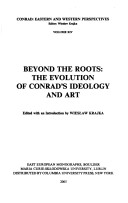East European Monograph (COUP)
4 total works
Beyond the Roots – The Evolution of Conrad′s Ideology and Art
by Wieslaw Krajka
Published 14 March 2006
This text includes a collection of nineteen papers that cover almost the whole of Conrad's writing career beginning with Almayer's Folly of 1889 and concluding with The Rescue of 1920. Written by scholars from eight different countries and three continents, they discuss a broad range of issues in the Conrad canon, essential for both the literary texts studied and some major trends in Conrad criticism. A majority of the papers concern "Heart of Darkness" which confirms its status as the writer's supreme masterpiece. However, the collection also consists of several comparative studies linking Conrad with other English authors like Milton, Blake and Lawrence.
In the Realms of Biography, Literature, Politics – Polish and East–Central European Joseph Conrad
by Wieslaw Krajka
Published 23 December 2010
The literary studies comprised in nineteenth volume of the "Conrad: Eastern and Western Perspectives" series, compare fact v. fiction/non-fiction, ideas, literary works, translations, literature and film. The works by Joseph Conrad analyzed in this volume comprise Almayer's Folly, "Heart of Darkness", "Amy Foster", Under Western Eyes, "Prince Roman", Conrad's non-fictional writings and his entire literary output. The variety of studies in reception of Conrad's works comprise a comprehensive factual survey of reception in one country and various types of creative reception: literary, translatory, artistic inspiration and influence, filmic. The reception sub-cluster shows various types of works of art in which Conradian patterns have been received: mostly literary prose, but also drama and theatricality, non-fictional prose, film.The volume presents not only various kinds of literary studies in the strict sense of the word but also those of the disciplines of humanities bordering on them, such as biography, studies in politics, history, axiology, filmic studies, translation studies and even remote ones (navigation studies).
The great variety of issues of biography, politics, literature and reception considered here - as related to Conrad and to various Polish and East-Central European matters and contexts - hopefully comprises innovatory considerations by either taking up new issues or significantly reinterpreting old ones.
The great variety of issues of biography, politics, literature and reception considered here - as related to Conrad and to various Polish and East-Central European matters and contexts - hopefully comprises innovatory considerations by either taking up new issues or significantly reinterpreting old ones.
A Return to the Roots – Conrad, Poland, and Central Europe
by Wieslaw Krajka
Published 23 February 2005
This study illuminates various aspects of the relationship between Joseph Conrad's literary work and his roots in Polish and East-Central European culture. In particular, it examines various aspects of Conrad's relationship to Poland-the evolution of his attitude toward his homeland, the influence of Polish literature on his work, his reception by Polish audiences-and to Russian literature, particularly Dostoevsky and Turgenev. This volume collects fourteen essays by scholars from the United States, Europe and beyond. It is critically diverse, containing elements of biography, psychoanalysis, film criticism, comparative literature, and sociological and philosophical interpretation. The scope of critical materials is equally wide-ranging: from considerations of Conrad's life and political attitudes to overviews of his entire oeuvre and focused studies of single literary works.
From Szlachta Culture to the Twenty–first Century, New Essays on Joseph Conrad`s Polishness
by Wieslaw Krajka
Published 23 April 2013
The volume opens with an appreciation of Conrad's Polishness by Jerzy Buzek, The President of the European Parliament. Its first section provides new illuminations of Polishness in Conrad's personality and oeuvre: from the szlachta cultural heritage of his ancestors and Polish contextualizations of "Prince Roman" through some aspects of the writer's identity and references to Polish culture and autobiographical elements in his works to their Polish translations and reception. The Eastern-Western frame for these studies is provided by insights into some relations of his literary works to Russian literature (Dostoevsky, Turgenev) and their reception in Ukraine and Germany. The essays represent various methodological approaches to studies in biography, historical-cultural contextualizations of literature, fact-and-fiction relationships, history of ideas, literary reception (documented surveys, translative and creative reception) and comparative literary criticism.


